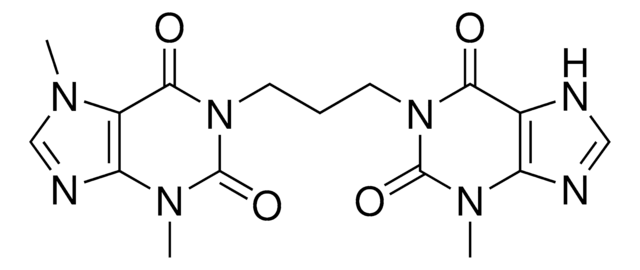10109878001
Roche
Trypsin Inhibitor
from chicken egg white
Synonym(s):
trypisin
Sign Into View Organizational & Contract Pricing
All Photos(1)
About This Item
UNSPSC Code:
12352207
Recommended Products
biological source
chicken egg white
Quality Level
form
powder
packaging
pkg of 1 g
manufacturer/tradename
Roche
concentration
1 mg/mL
technique(s)
cell culture | mammalian: suitable
optimum pH
3.8-4.5
solubility
water: soluble
storage temp.
2-8°C
General description
Egg white trypsin inhibitor is an inhibitor for trypsin, plasmin and plasma kallikrein activity in serum-free cell-culture media. It does not inhibit metallo-, cysteine, and aspartic proteases or tissue kallikrein (serine protease).
Application
Chicken egg Trypsin Inhibitor is used for the termination of tissue disaggregation and for subcultivation procedures.
Trypsin Inhibitor has been used:
- as a component of lysis buffer to treat Tsc2fl/fl (control) and Tsc2fl/flLyz2-Cre (knockout [KO]) bone marrow-derived macrophages (BMDMs) before immunoblotting
- to inactivate trypsin post detachment of the stem cells in ventricular zone cell culture
- to neutralize trypsin post dissociation and trypsinization of brain tissues
- termination of tissue disaggregation and for subcultivation procedures
Preparation Note
Working concentration: 0
Working solution: Solvent is recommended in distilled water.
Stock solution: 1 mg/ml
Storage conditions (working solution): -15 to -25 °C
Stable for at least 6 months in distilled water or 1 mM HCI when stored frozen in aliquots. Avoid repeated freeze-thaw cycles.
Working solution: Solvent is recommended in distilled water.
Stock solution: 1 mg/ml
Storage conditions (working solution): -15 to -25 °C
Stable for at least 6 months in distilled water or 1 mM HCI when stored frozen in aliquots. Avoid repeated freeze-thaw cycles.
Reconstitution
Both are soluble in water. Recommended stock solution: 1 mg/ml. Store frozen in aliquots at -15 to -25 °C. Stable for at least 6 months.
Storage and Stability
Store at 2 to 8 °C. (Store dry!)
Other Notes
For life science research only. Not for use in diagnostic procedures.
Storage Class Code
11 - Combustible Solids
WGK
WGK 2
Flash Point(F)
Not applicable
Flash Point(C)
Not applicable
Certificates of Analysis (COA)
Search for Certificates of Analysis (COA) by entering the products Lot/Batch Number. Lot and Batch Numbers can be found on a product’s label following the words ‘Lot’ or ‘Batch’.
Already Own This Product?
Find documentation for the products that you have recently purchased in the Document Library.
Customers Also Viewed
Membrane properties and electrogenesis in the distal axons of small dorsal root ganglion neurons in vitro.
Vasylyev DV and Waxman SG
Journal of Neurophysiology, 108(3), 729-740 (2012)
Maksim Sinyuk et al.
Journal of visualized experiments : JoVE, (160) (2020-06-23)
The methods presented here demonstrate laboratory procedures for the dissection of four different regions of the central nervous system (CNS) from murine neonates for the isolation of glial subpopulations. The purpose of the procedure is to dissociate microglia, oligodendrocyte progenitor
Haley M Peckham et al.
Journal of visualized experiments : JoVE, 95(95), 52179-52179 (2015-02-05)
Myelination is a complex process that involves both neurons and the myelin forming glial cells, oligodendrocytes in the central nervous system (CNS) and Schwann cells in the peripheral nervous system (PNS). We use an in vitro myelination assay, an established
Nikesh Kunder et al.
The Journal of neuroscience : the official journal of the Society for Neuroscience, 42(49), 9129-9141 (2022-10-22)
HuR is an RNA-binding protein implicated in RNA processing, stability, and translation. Previously, we examined protein synthesis in dorsal root ganglion (DRG) neurons treated with inflammatory mediators using ribosome profiling. We found that the HuR consensus binding element was enriched
Leandro Castaneyra-Ruiz et al.
Fluids and barriers of the CNS, 17(1), 46-46 (2020-07-22)
Severe intraventricular hemorrhage (IVH) is one of the most devastating neurological complications in preterm infants, with the majority suffering long-term neurological morbidity and up to 50% developing post-hemorrhagic hydrocephalus (PHH). Despite the importance of this disease, its cytopathological mechanisms are
Our team of scientists has experience in all areas of research including Life Science, Material Science, Chemical Synthesis, Chromatography, Analytical and many others.
Contact Technical Service









